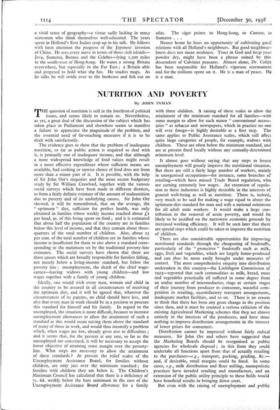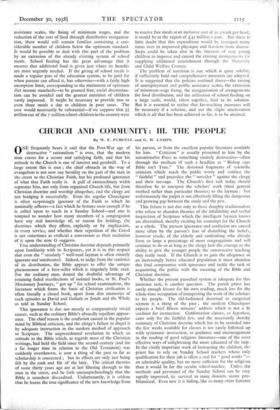NUTRITION AND POVERTY
By JOHN INMAN
THE question of nutrition is still in the forefront of political issues, and seems likely to remain so. Nevertheless, as yet, a great deal of the discussion of the subject which has taken place in Parliament and elsewhere seems to manifest a failure to appreciate the magnitude of the problem, and the essential need of far-reaching measures if it is to be dealt with satisfactorily.
The evidence goes to show that the problem of inadequate nutrition, so far as public action is required to deal with it, is primarily one of inadequate income, and that although a more widespread knowledge of food values might result in a more effective expenditure where sufficient means are available, bad cooking or unwise choice of food does not form more than a minor part of it. It is possible, with the help of Sir John Orr's enquiries and the more recent budgetary study by Sir William Crawford, together with the various social surveys which have been made in different districts, to form a fairly definite estimate of the amount of malnutrition due to poverty and of its underlying causes. Sir John Orr showed, it will be remembered, that on the average, the " optimum " diet, sufficient for perfect health, was only obtained in families whose weekly income reached about ki per head, 9s. of this being spent on food ; and it is estimated that about half the population of the country are in families below this level of income, and that they contain about three- quarters of the total number of children. Also, about 25 per cent. of the total number of children are in families whose income is insufficient for them to rise above a standard corre- sponding to the minimum set by the traditional poverty-line estimates. The social surveys have shown that there are three causes which are broadly responsible for families falling, not merely below a living-income standard, but below the poverty line : unemployment, the death of the chief wage- earner—leaving widows with young children—and low wages together with a family of young children.
Ideally, one would wish every man, woman and child in the country to be assured in all circumstances of receiving the optimum diet, and it will be agreed that, whatever the circumstances of its parents, no child should have less, and also that every man in work should be in a position to procure this standard for himself and his family. In regard to the unemployed, the situation is more difficult, because to increase unemployment allowances to allow the attainment of such a standard as this would mean raising them above the standard of many of those in work, and would thus intensify a problem which, when wages are low, already gives rise to difficulties ; and it seems that, for the present at any rate, so far as the unemployed are concerned, it will be necessary to accept the lower objective of attaining some margin over the poverty- line. What steps are necessary to allow the attainment of these standards ? At present the relief scales of the Unemployment Assistance Board, for families without children, are only just over the minimum standard ; for families with children they are below it. The Children's Minim' um Council has calculated that there is a deficiency of 7s. 6d. weekly below the bare minimum in the case of the Unemployment Assistance -Board allowance for a family with three children. A raising of these scales to allow the attainment of the minimum standard for all families—with some margin to allow for such minor "conventional necess- aries" as tobacco and newspapers, which in practice no one will ever forego—is highly desirable as a first step. The same applies to Public Assistance scales, which still affect quite large categories of people, for example, widows with children. These are often below the minimum standard, and are at present fixed locally without any centrally-determined minimum level.
- It almost goes without saying that any steps to lessen unemployment will greatly improve the nutritional situation. But there are still a fairly large number of workers, mainly in unorganised occupations—for instance, some branches of retailing—which have missed Trade Board regulation, who are earning extremely low wages. An extension of regula- tion to these industries is highly desirable in the interests of general well-being as well as nutrition. There is, indeed, very much to be said for making a wage equal to about the optimum-diet standard for man and wife a national minimum for all adult male workers. It would make a large con- tribution to the removal of acute poverty, and would be likely to be justified on the narrowest economic grounds by increased working efficiency. It will be seen later that there are special steps which could be taken to improve the nutrition of children.
There are also considerable opportunities for improving nutritional standards through the cheapening of foodstuffs, particularly of the " protective " foodstuffs such as milk, eggs, fruit and vegetables, which are largely home-produced and can thus be more easily brought under measures of control. The most comprehensive enquiry into distribution undertaken in this country—the Linlithgow Commission of 1923—reported that such commodities as milk, bread, meat and vegetables practically all suffered in some degree from an undue number of intermediaries, rings at certain stages of their journey from producer to consumer, wasteful com- petition in retailing, unsatisfactory transport arrangements, inadequate market facilities, and so on. There is no reason to think that there has been any great change in the position since then, and it must be counted a serious criticism of the existing Agricultural Marketing schemes that they act almost entirely in the interests of the producers, and have done nothing to improve distribution arrangements in the interest of lower prices for consumers.
Distribution cannot be improved without fairly radical measures. Sir John Orr and others have suggested that the Marketing Boards should be reorganised as public agencies for wholesale disposal ; in this form they could undertake all functions apart from that of actually retailing to the purchaser—e.g., transport, packing, grading, &c.— and, if desirable, retail margins could be fixed. In some cases, e.g., milk distribution and flour milling, monopolistic practices have invaded retailing and manufacture, and an extension of the public utility principle to these fields would have beneficial results in bringing down costs.
But even with the raising of unemployment and public assistance scales, the fixing of minimum wages, and the reduction of the cost of food through distributive reorganisa- tion, there would still remain families containing a con- siderable number of children below the optimum standard. It would be possible to deal with this part of the problem by an extension of the already existing system of school meals. School feeding has the great advantage that it ensures that additional food is given just where its benefits are most urgently needed. If the giving of school meals is made a regular part of the education system, to be paid for when parents can afford it, but otherwise—with a fairly high exemption limit, corresponding to the attainment of optimum diet income standards—to be granted free, social discrimina- tion can be avoided and the general nutrition of children vastly improved. It might be necessary to provide two or even three meals a day to children in poor areas. The cost would necessarily be substantial—if we suppose that 3.4,- million out of the 7 million school-children in the country were to receive free meals at an inclusive cost of 5s. a week per head, it would be in the region of £45 million a year. But there is little doubt that this expenditure would be recouped many times over in improved physique and freedom from disease. Steps could be taken also in the interests of very young children to improve and extend the existing arrangements for supplying additional nourishment through the Maternity and Child Welfare Centres.
The problem of nutrition is one which is quite soluble, if sufficiently bold and comprehensive measures are adopted. It is suggested that the policies outlined above—the raising of unemployment and public assistance scales, the extension of minimum-wage fixing, the reorganisation of arrangements for food distribution, and the utilisation of school feeding on a large scale, would, taken together, lead to its solution. But it is essential to realise that far-reaching measures will be necessary if a solution, and not the slight amelioration which is all that has been achieved so far, is to be attained.



































 Previous page
Previous page